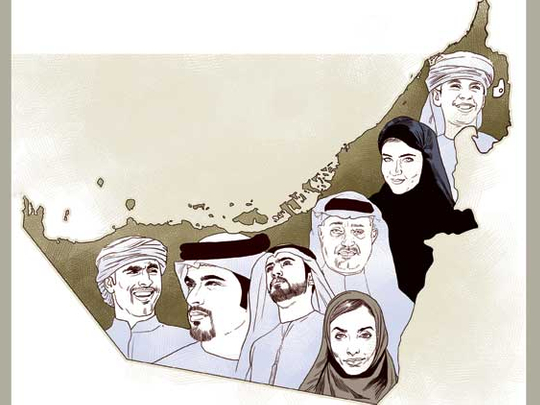
After 42 years, the UAE has become a self-confident nation without the dangerous nationalistic arrogance that mars some national cultures. It is committed to working within the global community of nations, and is an active member of the Gulf and Arab communities, secure in the knowledge that its young generation is growing up in full accord with the direction the country is taking. The internal cohesion of Emirati society is an important political asset for the nation at a time of great regional turbulence.
For much of its early history the UAE focused on building its internal strengths and it did not play a leading part in the great political dramas of the 1970s to 1990s. Its high standing in the Arab world depended on the great respect accorded to the UAE’s founding president, Shaikh Zayed Bin Sultan Al Nahyan, for his consistent pan-Arab views and insistence that all issues can be solved by respectful negotiation.
But despite its small size and the huge developmental challenges the country faced when it achieved independence in 1971, the UAE has a proud record of putting its people into action when required.
For example, for the past two years it has hosted a huge refugee camp in Jordan helping to house the millions of Syrian fleeing the brutal civil war, and this continues a long tradition of similar help like when the UAE opened large refugee camps in Kosovo in 1999, and again in Pakistan in 2001 after the invasion of Afghanistan, and more recently after the disastrous floods in Pakistan.
A different kind of commitment has been when the UAE has committed its people to armed combat, such as when the UAE sent its armed forces along with all other GCC members to take part in the liberation of Kuwait in 1991, and later to be part of the ISAF-Nato forces in Afghanistan after 2001 after the toppling the Taliban regime.
The confidence of the UAE is based on secure self-knowledge as the population and leadership are united in mutually understanding their shared values, based around a high respect for traditional ethical standards combined with global tolerance. At no time was this more obvious than during the trial this summer of more than 100 people of whom 69 were found guilty of being supporters of the Muslim Brotherhood who sought to destabilise the UAE.
It was important that there was widespread public dismay at the activities of this minority group, which had achieved no traction on the public mind. This trial was an important test of national unity as it was the first time that a well organised group had set out to subvert the state, and it was significant that there was no widespread support for the Brotherhood members.
This national consensus is something that has been worked on carefully. It has required the leadership to have set out its targets clearly, so the entire public know where the government is seeking to take the country. The transparency of this combination of government vision and practical implementation has been at the heart of getting genuine public support for the government.
Looking ahead, the UAE will continue its commitment to its traditional liberal values and to tolerance, and as the apparently endless turbulence of Middle Eastern politics wash around the region, the UAE is well aware that long-term stability and security depend on nurturing its people. The government will continue to focus on providing its people with the best education possible, giving them the legal environment in which they can develop their ambitions and proposer.
It is good that the UAE’s economy has become a lot more varied in recent years. Abu Dhabi’s overwhelming reliance on its massive oil industry has been tempered by its investment in several well-chosen strategic industries.
Dubai is set become a major global hub and the crossroads of the world, as its bid to host Expo 2020 made abundantly clear. Sharjah has a well established place as an intellectual and academic centre. And recent years has seen growing prosperity spread throughout the northern emirates as investment has followed opportunity.
This powerful economic situation means that Emiratis from all over the country can seek to further their ambitions and improve their lot, and the spreading of prosperity and integration between the activities in all the seven emirates has encouraged the strong sense of national identity.
This is vital for the country’s future as the 15 per cent of the population that is Emirati seeks to maintain its identity. The UAE has deliberately welcomed its large expatriate population in order to develop its economy to levels that would not have been possible without outside help.
But natural fears of being swamped by the large number of foreigners triggered an important focus on nurturing a sense of national pride and Emirati identity, which will be all the more important as the 65 per cent of the Emirati population that is under 25 grows up and takes its place in the adult world.
This national day is a chance to reflect on the achievements that have taken the country from its very simple beginnings in 1971, to the extraordinary level of development today, while also thinking ahead and to the future and where the UAE might go in its next 40 years.









